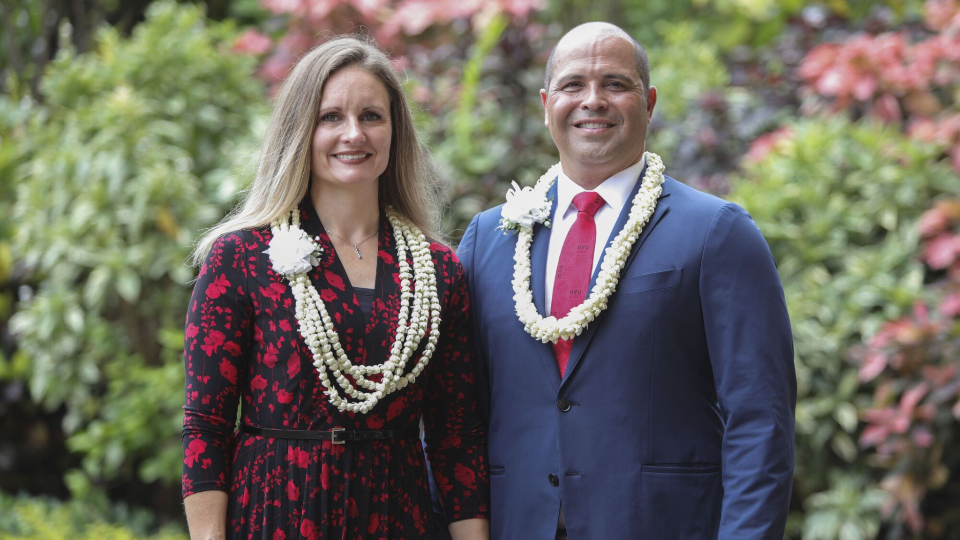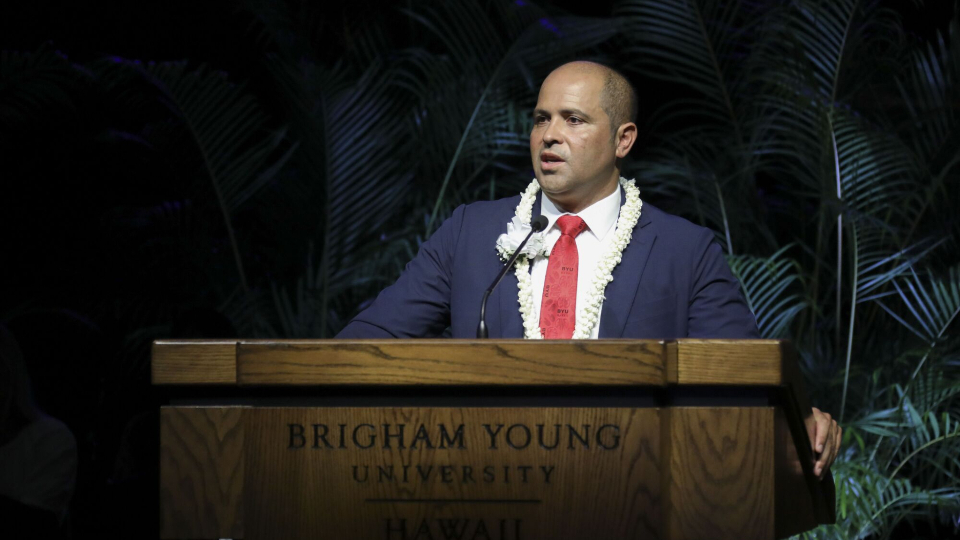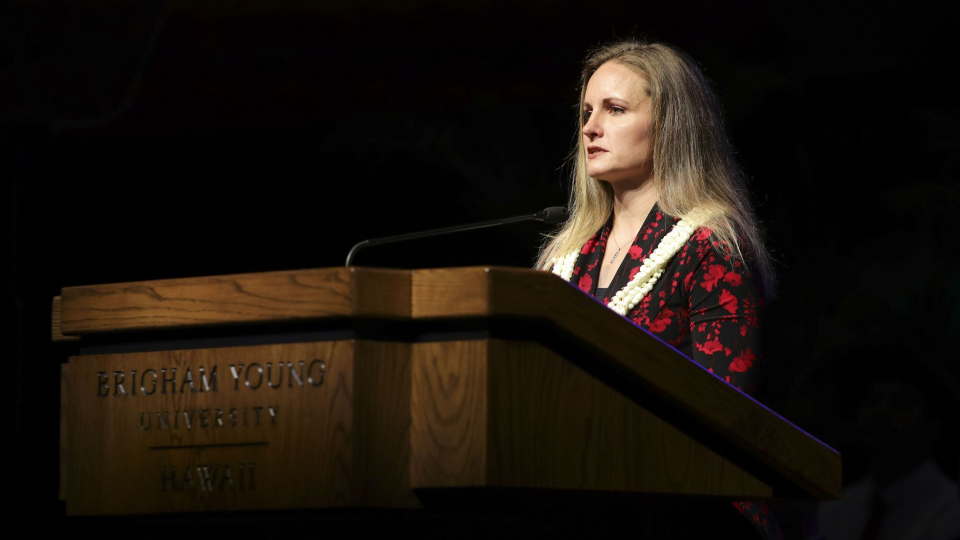
BYU-Hawaii-April-2023
BYU–Hawaii President John S.K. Kauwe III and his wife, Sister Monica Kauwe, pose for a photo following the opening devotional for the semester on Tuesday, May 2, 2023, in Laie, Hawaii. Photo by Monica Saenz, BYU–Hawaii, courtesy of Church News.All rights reserved.
This story appears here courtesy of TheChurchNews.com. It is not for use by other media.
By Rachel Sterzer Gibson, Church News
In 1921, Church President David O. McKay met with members of the Church in an old chapel in Laie, Hawaii. Hawaiians, Japanese, Chinese, Filipinos and others all worshiped together as one.
“What an example in this little place of the purposes of our Father in Heaven to unite all peoples by the gospel of Jesus Christ,” President McKay said.
Today, at the Church’s university in Laie, “we continue to resemble that diverse group President McKay encountered more than a century ago,” BYU–Hawaii President John S.K. Kauwe III commented during the opening campus devotional for spring semester.
President Kauwe noted that for spring 2023, BYU–Hawaii has 2,495 students representing 60 countries and territories, with 67% of the student body coming from areas in Oceania and the Asian Rim.
“I could continue to describe you by additional identifiers. I could highlight the mathematicians, or the historians, the vocalists, or the political scientists,” he said.
Instead, President Kauwe reminded students of who President Russell M. Nelson said they are: children of God, children of the covenant and disciples of Jesus Christ (“Choices for Eternity,” Worldwide Devotional for Young Adults).
Speaking to students and faculty gathered in the Cannon Activities Center on Tuesday, May 2, President Kauwe noted that being a part of BYU–Hawaii involves making and keeping covenants, or as President Nelson taught, being children of the covenant.
“Perhaps some of you might not know exactly what that means. Today I want to share with you what it means to be a child of the covenant.”
Child of the Covenant
Being a part of BYU–Hawaii involves making and keeping covenants, President Kauwe said.
He quoted President Nelson, who listed the promises and blessings associated with being part of the Abrahamic covenant and taught, “When we realize that we are children of the covenant, we know who we are and what God expects of us” (“Covenants,” April 2011 general conference).
“Do you know who you are? Do you know what God expects of you?” President Kauwe asked listeners. “A clear answer to both questions clarifies so much about our lives. We are blessed to be at a special university where we collectively understand that we are children of the covenant who seek to love God and follow His commandments. We know that there are great promises associated with our covenants.”
In mortal life, God provides guidance through covenants, he said. “Being a child of the covenant means that we have accepted the teachings of God, that we are allowing Him to parent us through His plan, through making and striving to keep covenants.”
God knows that His children will fall short in their efforts to honor their covenants, President Kauwe said.
Remember that striving to honor covenants doesn’t entail perfection. “When you struggle and make mistakes, please remember that Jesus Christ is merciful and forgiving, President Kauwe said. “He asks you to come to Him with a broken heart and a contrite spirit. His Atonement is there to give you strength and hope. He can heal all wounds and forgive all sins. Be patient with yourself.”
Elder D. Todd Christofferson of the Quorum of the Twelve Apostles taught that the Church is the custodian of the covenants of salvation and exaltation and that it is through covenants that individuals obtain the highest and deepest sense of belonging.
“Once you and I have made a covenant with God, our relationship with Him becomes much closer than before our covenant,” Elder Christofferson said. “Now we are bound together. Because of our covenant with God, He will never tire in His efforts to help us, and we will never exhaust His merciful patience with us. Each of us has a special place in God’s heart” (“The Doctrine of Belonging,” October 2022 general conference).
Covenants connect individuals not only with God, but with each other, President Kauwe continued, and part of that covenantal belonging is partnering with Christ to provide relief to all of God’s children.
“I testify that this is true,” he said. “No one on this campus can make a bigger difference in the lives of your fellow students than you can.”
Sometimes interactions with others can be difficult, President Kauwe noted. He reminded listeners of President Nelson’s teachings during the last general conference.
Anger, hostility and contention never lead to inspired solutions, President Nelson said. Regrettably, contentious behavior is sometimes found among Latter-day Saints.
“My dear brothers and sisters, this should not be,” President Nelson declared. “As disciples of Jesus Christ, we are to be examples of how to interact with others — especially when we have differences of opinion. One of the easiest ways to identify a true follower of Jesus Christ is how compassionately that person treats other people.”

BYU-Hawaii-April-2023
BYU–Hawaii President John S.K. Kauwe III speaks during campus devotional on Tuesday, May 2, 2023, in Laie, Hawaii. Photo by Camille Jovenes, BYU–Hawaii, courtesy of Church News.All rights reserved.
President Kauwe testified of the truth of the Prophet’s words. “We have been called to a different kind of communication as disciples of Jesus Christ. We cannot simply replicate discord and contention here. We have been shown a different way, a better way. Remember what President McKay charged us to do; we are to be an example in this little place.”
In closing, President Kauwe expressed his desire for students to seek covenant belonging. “I pray that we will increase our efforts to support each other and as we are refined by this mortal experience. I pray that we will shed the insignificant and unimportant aspects of our lives and spend our time and energy on loving and serving each other with the Christlike compassion that identifies a true follower of Jesus Christ.”
‘Let Us Go to the Temple’
In her remarks, Sister Monica Kauwe shared how she and her family have been making greater efforts to attend the temple more often, following the invitation of President Nelson.
Her increased temple attendance has also inspired her to learn more about her ancestors and how they joined the Church. Their stories of faith “give me strength and are a reminder of how devoted and committed my ancestors were to the gospel of Jesus Christ. What they wanted more than anything else was to get to the temple and enjoy the blessings of eternity,” she said.

BYU-Hawaii-April-2023
Sister Monica Kauwe speaks during campus devotional on Tuesday, May 2, 2023, in Laie, Hawaii. Photo by Monica Saenz, BYU–Hawaii, courtesy of Church News.All rights reserved.
The Laie Hawaii Temple, located just adjacent to campus, is an important part of a student’s experience at BYU–Hawaii, Sister Kauwe said. “Plan to attend the temple as often as you can so that you can make covenants there and do work for your families. Some of you may even have the opportunity to become temple workers and contribute to the work in that way.”
Sister Kauwe said she shares in students’ joy as temples are announced for Oceania and the Asian Rim. “Your experience here will prepare you to help do the work in the temple in the future, perhaps even in your hometown. Do what you can here to show the Lord that you are prepared and ready to help build new temples as they are announced across the world because you are available and know what to do both as a temple worker and as a patron.”
Copyright 2023 Deseret News Publishing Company.
